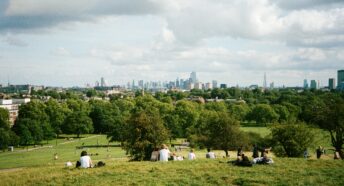Charities say 25% of public kerbside space should be freed from parked cars
A group of charities has come together to demand action to call for 25% of public kerbside space to be freed-up from cars and reallocated to other uses like bus and cycle lanes, wider pavements, and for the trees and rain gardens needed to make streets attractive, reduce flooding and air temperature, and support nature’s recovery.
Climate charity Possible, pedestrian campaign Living Streets and the countryside charity CPRE London launched the Parking Action Tool on 22 May 2023.
The online tool enables users to complete a series of checkboxes on aspects of parking policy such as permit charges and disability access. The tool returns a score of Good, Needs Improvement or Needs Urgent Action. Local authorities can use it to identify areas for action, and local residents can use it to ask for change.
The charities say parking policy is one of the most effective tools local authorities can use to promote walking, cycling and public transport and reduce car trips – and so combat global warming, deliver clean air and dramatically reduce the risk of serious diseases.
Alice Roberts of CPRE London said: “Most councils are nowhere near making best use of their parking powers even where a climate emergency has been declared or there are serious health risks for local people linked to inactivity and poor air quality. Parking pays for itself so is something local authorities can afford to take action on right now. And council leaders have already said themselves that parking management is a crucial part of their policy toolbox in relation to ‘decarbonising’ transport (LGA’s 2020 publication Decarbonising Transport: climate smart parking policies). So there’s no excuse for delay.”
Carolyn Axtell, Car Free London campaigner at Possible, said: “Even councils that are using their parking policies to encourage a shift to more sustainable transport choices and reduce the overall number of car trips could be much more ambitious in using those policies to reduce traffic and cut carbon. Then we could be within realistic territory of achieving a more equitable and sustainable approach to the use of our kerbside space.”
ENDS








